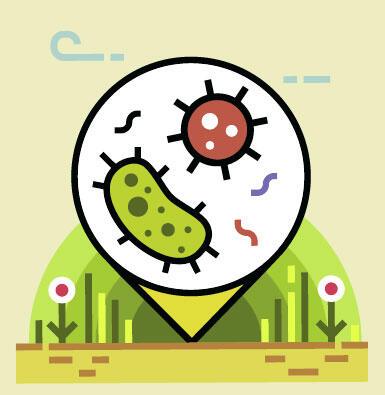What is soil health anyway?
Soil health is a vibrant ecosystem of the soil web consisting of bacteria, fungi, and protozoa all working together to create the nutrients, soil structure and humus that allows plants to thrive. Feed the soil and let the soil feed your plants. Think of it terms of a human for a moment…we can grab a bag of potato chips and our hunger goes away, but those are calories and nutrition that we burn through easily (some of us anyway). Or we could eat a more nutritious meal with protein, vegetables and a small amount of carbohydrate-whose components contribute to the longer-term functioning of the body. Minding only the N-P-K ratios that go into the soil for the plant to use neglects the health of the food web components, the billions of bacteria, fungi and protozoa that help make nutrients available to plants.
In short, healthy soil contains mostly topsoil with appropriate levels of organic matter and porosity, abundant levels of diverse soil biology and serves as both an anchor for plants and as a reservoir for water, nutrients and the microbial habitat.
When it comes to the first thing you should know…you need to understand that soils and potting soils are not the same thing. There are mediums (soil used for growing) that are to be used just as potting soil and others meant to be used in the garden. If you put topsoil in a pot or planter, your plant will have a hard time with drainage. This is a part of physics.
Another piece of knowledge to hold onto is that the soil you walk on and the soil in our flower beds are ALIVE. You may find rocks, organic matter and pockets of air, but the soil is teeming with life. Good healthy soil has a lot of biological activity that happens naturally. Understand that when we add amendments (humus, compost, mushroom soil) to our gardens, we are feeding soil microbes and helping them proliferate (a beneficial thing for our gardens).
The beauty of a soil analysis is that it tells us what the soil REALLY needs and what the soil already has, so that we don’t overapply anything. A heathy soil really will reduce the amount of weed killer, fungicides and fertilizers you’ll need to apply. This can save you time and money in the long run.
By having a soil analysis prepared by the Penn State Extension, you can opt to have Herbein’s Garden Center receive a copy of your test results to keep on file. We have a qualified specialist that can decipher your results for you and recommend any needed products to increase your soil’s health.
Instead of taking the “quick-fix” solution, try changing the way you think about your soil so you can move towards building long-term success, sustainability and vigor in your soil.
—pay a little more attention to Mother Earth and care for Mother Earth



